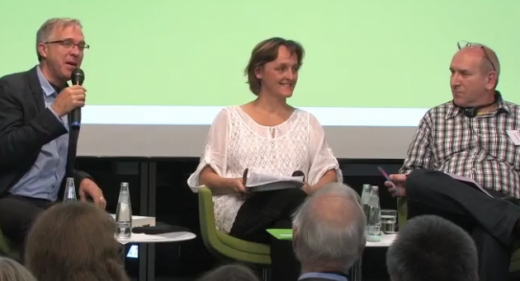“We need to stop looking for definitions of the Commons as a notion, as a concept, because in fact it’s not about a thing but a way of being in the world” Silke Helfrich of Commons Institute and the Commons Strategies Group interviewed by members of Zemos98 during last November’s European Commons Assembly in Brussels.
“As urban commons in Barcelona and elsewhere mature, commoners are facing some difficult and novel challenges” David Bollier recounts his recent visit
Michel Bauwens recently spoke at the Harvard Berkman Center to give his big-picture analysis of the economic and social transition now underway. The hour-long video of his talk provides a clear explanation for why peer production is flourishing and out-competing conventional business models and markets.
Thom Hartmann, the progressive talk show host, interviews David Bollier in the “Conversations with Great Minds” national TV show. Contains the two videos with the interview.
The fundamental transformation of our social, political and economic systems requires more than a local approach, it requires trans-local practices and forms of organization.
The next step for commons-oriented publishing is to invent new sorts of cooperative book distribution systems so that small presses can avoid the crippling fees charged by the conventional book distributors.
One of the more complicated, mostly unresolved issues facing most commons is how to assure the independence of commons when the dominant systems of finance, banking and money are so hostile to commoning. How can commoners meet their needs without replicating (perhaps in only modestly less harmful ways) the structural problems of the dominant money system?
I’m thrilled to report that the Commons Strategies Group finally has its own handsome, up-to-date website! Whenever anyone asks me about the commons work that I’ve been doing over the past five or six years – and that of my dear colleagues Silke Helfrich and Michel Bauwens – I can now point them to this beautifully designed site.
A step through the city of the Commons of 2040, an environment that can provide the conditions and infrastructures for commoning in urban areas.
Patterns of Commoning is arguably the most accessible and broad-ranging survey of contemporary commons in print.
A summary from the Commons Strategies Group recent event in Berlin.
“In King John’s time, enclosure was mostly about the forest. Today it’s about everything, including life itself.” The Magna Carta and Law for the Commons.
Contribute to the phase transition first; and be ready for the coming sparks and organic events that will require the mobilization of all.
A detailed infographic based on Silke Helfrich’s shorthand comparison of the logic of the market and the logic of the commons (as well as their core beliefs).
In our vision, it is the integration of the economic work of peer production, outlined just above, and the broader work of social and political re-organization around commons-centric institutions, which will set the stage for a rebirth of an offensive social and political movement that will have a good chance to promote a phase transition to a commons-centric political, social and economic society.













